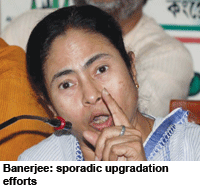The dominant political culture of the eastern seaboard state of West Bengal is a unique amalgam of fierce bourgeois (bhadralok) sub-nationalism and communism. Nevertheless some traditions of the British Raj (1757-1947) survive in this state (pop.80 million) whose electorate has uninterruptedly returned the Communist Party of India-Marxist (CPM)-led Left Front government to power in Writers Building, Kolkata (formerly Calcutta) for seven five-year terms. One enduring tradition of the Raj is the winter break over Xmas and New Year for the state’s 354 undergraduate colleges which dispense tertiary education of questionable quality to 426,580 students.
The winter holiday is conveniently utilised for staging student union elections in all of West Bengal’s 354 colleges. For over three decades ever since the CPM (which claims a card-carrying membership of 10.4 million in the state) dominated Left Front was first elected to office in 1977, collegiate elections have been quiet affairs because the CPM sponsored Students’ Federation of India (SFI, claimed membership 3.5 million) inevitably steamrolled the opposition to dominate the state’s 18 universities and 354 colleges.
 This year, however, the scenario is entirely different. In a development that has shocked West Bengal’s estimated 25 million educated middle class citizens including the intelligentsia, blood has been spilled on the state’s campuses following violent clashes between student members of SFI and the Trinamool Chhatra Parishad (TCP), the students wing of the Trinamool Congress party, led by firebrand woman politician (and Union minister for railways in the Congress-led UPA-II government at the Centre) Mamata Banerjee.
This year, however, the scenario is entirely different. In a development that has shocked West Bengal’s estimated 25 million educated middle class citizens including the intelligentsia, blood has been spilled on the state’s campuses following violent clashes between student members of SFI and the Trinamool Chhatra Parishad (TCP), the students wing of the Trinamool Congress party, led by firebrand woman politician (and Union minister for railways in the Congress-led UPA-II government at the Centre) Mamata Banerjee.
The winds of political change are blowing hard across West Bengal signaling the end of the CPM’s long and unproductive reign in the state. Popular sentiment has swung towards the Trinamool established in 1998 by Congress breakaway leader Banerjee. In the 2010 municipal elections in Kolkata, Trinamool won 97 of 141 seats; in the 2009 Lok Sabha elections it won 26 out of 42. With elections to the state’s legislative assembly scheduled for this summer, the auguries are that finally, it’s curtains for the CPM.
This is the backdrop against which 2010 students’ union elections were held in college campuses statewide. Altho-ugh few expected the SFI backed by CPM cadres, to give up without a fight, nobody anticipated the aggressive tactics of SFI members and CPM cadres to be as shockingly brutal and ruthless as they turned out to be. In the union elections, dozens were injured and 15 students mainly of TCP, lost their lives.
But with the public somewhat belatedly beginning to appreciate that during the past 33 years that the CPM has been in power, the party has precipitated a massive flight of capital which has de-industrialised West Bengal and that it has ruined the state’s once highly-reputed education system by infiltrating the academy with CPM ideologues while encouraging militant student unionism, SFI’s show of force was in vain. On December 21 when counting of votes was getting close to completion, it was apparent that SFI was trailing in 90 percent of the state’s 282 colleges where student union elections were recently held. And the indications are that SFI which won in 225 colleges last year (2010), is likely to experience a severe defeat this year. Perhaps in anticipation of a poll reverse (the final results will be declared in February), SFI called a students strike on December 20 which according to all indicators was successful not because of SFI’s popularity, but because of the CPM student wing’s reputation for violence. In the event the strike may well prove to be another nail in SFI’s self-made coffin.
In any event most academics in Kolkata who are busy preparing for a regime change after the state assembly elections of this summer (April-May), are inclined to dismiss the show of strength of SFI and CPM cadres on college campuses as the flailing death throes of the CPM and its affiliates.
In all likelihood the results of student elections in the state’s 354 colleges will indicate that 33 years since it was first elected to govern West Bengal with great expectations — most of which remain undelivered — CPM’s party is finally over.
Sujoy Gupta (Kolkata)